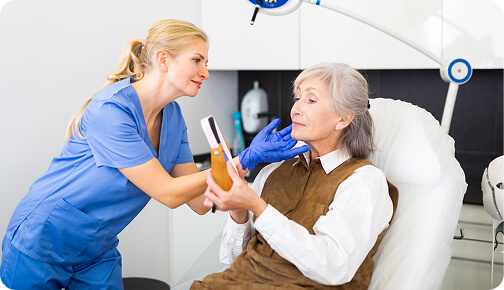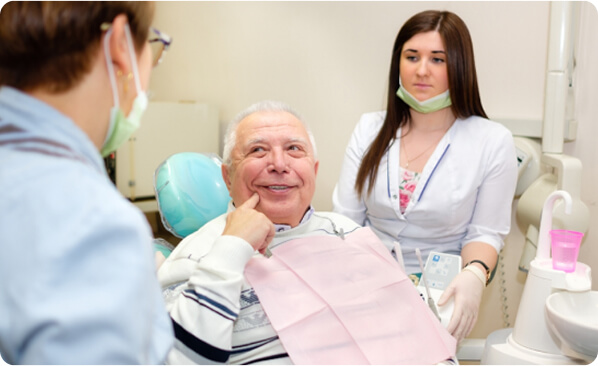Gum Disease Treatment (Periodontal Procedure)
In Edmonds & Serving Patients In Seattle, WA

Gum Disease Treatment (Periodontal Procedure) In Edmonds & Serving Patients In Seattle, WA
Gum disease is the most common form of oral disease. According to the CDC, as many as four out of ten adults over the age of 30 in the United States suffered from some stage of periodontal disease in a 2009-2014 study [Source 1, Source 2]. While gum disease starts as mild inflammation, it can become a more serious issue if left untreated, potentially leading to health complications.
Your good health is paramount to living a good life. Because most of us are born with healthy gums and teeth, we tend to overlook and neglect oral hygiene throughout our younger years–a decision that can significantly impact our lives (and our smiles).
Dr. Javadi of Orchid Periodontics & Dental Implants has helped many patients successfully manage and slow the progress of periodontal disease. Taking care of your teeth and gums does more than ensure you’ll have a smile to show off for years to come. Proper oral hygiene habits, regular dental appointments for a routine teeth cleaning, and seeking gum disease treatment from a periodontist in the Edmonds and Seattle area may help you avoid advanced and more severe gum issues.
What Is Gum Disease?
When bacteria and plaque begin to settle and build on your teeth and gums, they can harden, forming into tartar. Once tartar develops, it may start to affect areas below the gum line. If left untreated, it may lead to irritation, inflammation, and gum disease. Common symptoms of gum disease include red, puffy gums that bleed easily.
Once gum disease progresses past a certain point, it becomes periodontitis. This advanced form of the disease can lead to receding gums that may expose the roots of your teeth to harmful bacteria and tartar build-up. The roots may begin to decay, which can cause your teeth to become loose, misaligned, and painful. Without proper treatment from a periodontist such as Dr. Javadi, you may eventually experience the loss of the affected teeth.

- Smoking
- Poor oral hygiene practices
- Diabetes
- Genetic predispositions for gum problems
- Certain prescription medications
- Poor nutrition
- Changes in hormones
- Some autoimmune conditions
- High-stress levels
Benefits Of Treating Periodontal Disease
It can be shocking–and a little scary–to hear you have gum disease, especially if it’s in a more advanced stage. Your mind immediately starts thinking of all the steps required to treat gum disease and the time and commitment it takes to regain oral health.

First, let’s focus on the benefits that come with proper gum disease treatment in Edmonds, such as:
- Removal of the bacteria that cause the disease
- Eliminate bad breath (halitosis)
- Renewal of your gums, teeth, and complete oral health
- Stop bone loss in the teeth and jaw
- May produce better immunity against illness and infection
- Can help improve your digestion
- Lowers the risk of health issues associated with gum disease (stroke, heart disease, etc.)
Gum Disease Treatment (Periodontal Procedure) In Edmonds & Seattle
There are both non-surgical and surgical options available for gum disease treatment in Seattle. The treatment that’s best for you will depend on the severity of your periodontal disease. A appointment with Dr. Javadi will give you a better idea of your options and what sort of treatment will best suit your situation.
The minimally invasive options for periodontal treatment include:
Scaling and Root Debridement
The first step in this treatment is known as scaling. Dr. Javadi and her team will use specialized instruments to remove tartar build-up from your teeth, gumline, and even beneath the gumline. The second half of this treatment is root planing, which is when Dr. Javadi will smooth the roots of your teeth. This helps the gums reattach to the teeth and prevents bacteria from entering the gumline in the future.
Laser Periodontal Therapy
Dr. Javadi takes almost the same approach during a laser therapy treatment as she does in the scaling and root planing technique. However, with laser periodontal therapy, she will use a targeted beam of energy to aid in cleaning below the gumline. This laser beam can effectively remove tartar and bacteria, sterilize the area, and help slow the progress of periodontal disease.
The surgical options for more severe cases of periodontal disease are:
Pocket Reduction Surgery
Periodontal disease can lead to deep pockets in the gums. These pockets allow bacteria and tartar to get between your gum and tooth, leading to bone loss. During pocket reduction surgery, Dr. Javadi will separate the gum's soft tissue from the tooth before removing tartar and bacteria. Dr. Javadi will also remove gum tissue (if necessary) before reattaching the gum to the tooth. This surgery successfully reduces the periodontal pocket, so bacteria can’t settle between the gum and tooth in the future.
Dangers Of Untreated Gum Disease
At the start, gingivitis is a reversible condition. To treat this mild inflammation of your gums, you’ll need to stick to a dental hygiene routine that includes brushing your teeth and flossing to prevent plaque build-up and food deposits from being left behind on your teeth. These can contribute to more bacteria in your mouth, especially along your gumline. You should also use mouthwash to control this bacteria since it can settle in hard-to-reach areas (like the gumline). If gingivitis has already progressed to periodontitis, you’ll likely need to consider more extensive treatments like gum or bone grafting or dental implants to replace lost teeth.

Once you receive a periodontal disease diagnosis, seeing a periodontist and following their recommended treatment plan is crucial to your overall health. Severe gum disease can contribute to health issues and has ties to conditions like diabetes, heart disease, dementia, and respiratory problems. People with periodontitis could even be more susceptible to severe cases of seasonal illnesses such as the flu since poor oral health may weaken your immune system.
In addition to the impact on your health, gum disease may lead to tooth decay and a less aesthetically appealing smile. The build-up of bacteria in your mouth can also contribute to halitosis, which is a condition that causes chronic bad breath. Gum disease impacts your oral health, physical well-being, and self-confidence, which can affect your overall quality of life.
Why Choose Orchid Periodontics & Dental Implants For Gum Disease Treatment?

You shouldn’t have to hide your teeth or be ashamed of your smile because of receding gums or missing teeth. The Orchid Periodontics & Dental Implants team aims to restore your confidence and oral health with our periodontal treatment options and customized dental implants. Our experienced team provides comprehensive patient care and has helped many patients recover their confidence and improve their quality of life with customized treatment plans.
How Much Does Gum Disease Treatment Cost In Edmonds & Seattle, WA?

The cost of treatments and surgery for gum disease can range from a few hundred to several thousand dollars. Your expenses for periodontal treatment depend on how extensive the gum disease is. The earlier treatments begin, the less likely it will cost you as much to manage the condition and get the treatments you need.









Frequently Asked Questions
Is Gum Disease Treatment Painful?
Going in for your routine dental check-up and teeth cleaning can be nerve-wracking. Your dental appointment may cause even more anxiety if you know you have a condition like gum disease that’s going to require ongoing treatment. Thankfully, the options for managing gum disease are much improved–and less painful–than they have been in the past.
At Orchid Periodontics & Dental Implants, Dr. Javadi uses oral sedation to help patients relax during gum disease treatments. This sedation will allow your body to rest and feel more at ease throughout your appointment. If you need surgical treatment for gum disease, Dr. Javadi will also prescribe pain medication so you can recover comfortably.
How Long Does Recovery Take After Gum Surgery?
Many patients will need one to two weeks to recover before they can get back to all activities, including exercise; however, patients can usually return to their other daily routines, such as work, household chores, errands, etc., within the first week or so. Your exact recovery timeline will depend on:
- The type of surgery you’re having
- Your body’s response to surgery
- The severity of gum disease
- The number of teeth treated
- The size of the gum or bone graft area
Can Gum Disease Be Reversed?
If you are in the early stages of gum disease, the right treatments can help limit–or even better–reverse the effects. However, if periodontal disease has led to bone loss, it isn’t reversible–though it is still manageable!
Depending on the condition of your gums, you might need surgical treatments to prevent further effects of periodontal disease. Maintaining a consistent routine of brushing your teeth twice daily, flossing, and using an antibacterial mouthwash is essential to protecting your gums, teeth, and oral health.
Contact us
Contact us using the information below. We’ll respond promptly to your inquiries and feedback
Hours of Operation
Our Regular Schedule
- MondayClosed
- Tuesday7:00 am - 3:00 pm
- wednesday7:00 am - 3:00 pm
- Thursday7:00 am - 3:00 pm
- FRIDAY1st & 3rd Friday of the month
- SaturdayClosed
- SundayClosed
Schedule An Appointment For Periodontal Treatment For Gum Disease
It can be easy to get overwhelmed when you’re dealing with gum disease and searching for a qualified periodontist. Fortunately, the Orchid Periodontics & Dental Implants team can help you get the treatment you need. Dr. Javadi will assess the impact of periodontal disease on your gums and teeth before recommending the best treatment plan to help you regain your oral health.
Call us at (425) 775-2002, or schedule your appointment online today!